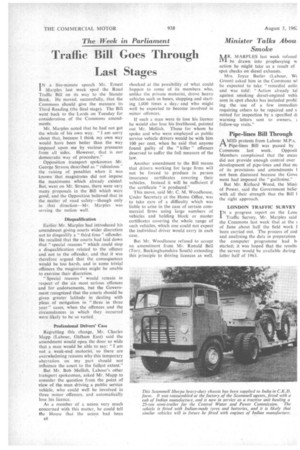Traffic Bill Goes Through Last Stages
Page 34

If you've noticed an error in this article please click here to report it so we can fix it.
I N a five-minute speech Mr. Ernest Marples last week sped the Road Traffic Bill on its way to the Statute Book. He moved, successfully, that the Commons should give the measure its Third Reading (the final stage). The Bill went back to the Lords on Tuesday for consideration of the Commons amendments.
Mr. Marples noted that he had not got the whole of his own way. "1 am sorry about that, because I think my own way would have been better than the way imposed upon me by various pressures from all sides. However, that is our democratic way of procedure."
Opposition transport spokesman Mr. George Strauss described as " ridiculous" the raising of penalties when it was known that magistrates did not impose the maximums which already existed. But, went on Mr. Strauss, there were very many proposals in the Bill which were good, and the Opposition believed that in the matter of road safety—though only in that direction—Mr. Marples was serving the nation well.
Disqualification Earlier Mr. Marples had introduced his amendment giving courts wider discretion not to disqualify a " third time" offender. He recalled that the courts had laid down that "special reasons" which could stop a disqualification related to the offence and not to the offender, and that it was therefore argued that the consequences would be too harsh, and in some trivial offences the magistrates might be unable to exercise their discretion.
"Special reasons would remain in respect of the six most serious offences and for endorsements, but the Government recognized that the courts should be given greater latitude in dealing with pleas of mitigation in " three in three year" cases, when the offences and the circumstances in which they occurred were likely to be so varied.
Professional Drivers' Case Regretting this change, Mr. Charles Mapp (Labour, Oldham East) said the amendment would open the door so wide that a man would be able to say: "I am not a week-end motorist, so there are overwhelming reasons why this temporary aberration on my part should not influence the court to the fullest extent."
But Mr. Bob Mellish. Labour's other transport spokesman, asked Mr. Mapp to consider the question from the point of view of the man driving a public set-vice vehicle, who could well be involved in three minor offences, and automatically lose his licence.
As a member of a union very much concerned with this matter, he could tell the House that the union had been 138 shocked at the possibility of what could happen to some of its members who, unlike the private motorist, drove heavy vehicles such as buses, stopping and starting 1,000 times a day,and who might well be expected to become involved in minor offences.
If such a man were to lose his licence he would also lose his livelihood, pointed out Mr. Mellish. Those for whom he spoke and who were employed as public service vehicle drivers would be with him 100 per cent. when he said that anyone found guilty of the " killer offences deserved to suffer the full measure of the law.
Another amendment to the Bill means that drivers working for large firms will not be forced to produce in person insurance certificates covering their vehicles. Instead it will be sufficient if the certificate "is produced."
This move, said Mr. C. M. Woodhouse, Under Secretary at the Home Office, was to take care of a difficulty which was liable to arise in the case of certain commercial firms using large numbers of vehicles and holding block or master certificates covering the whole range of such vehicles, which one could not expect the individual driver i.vould carry in each case.
But Mr. Woodhouse refused to accept an amendment from Mr.. Ronald Bell (Tory, Buckinghamshire South) extending this principle to driving licences as well.
































































































